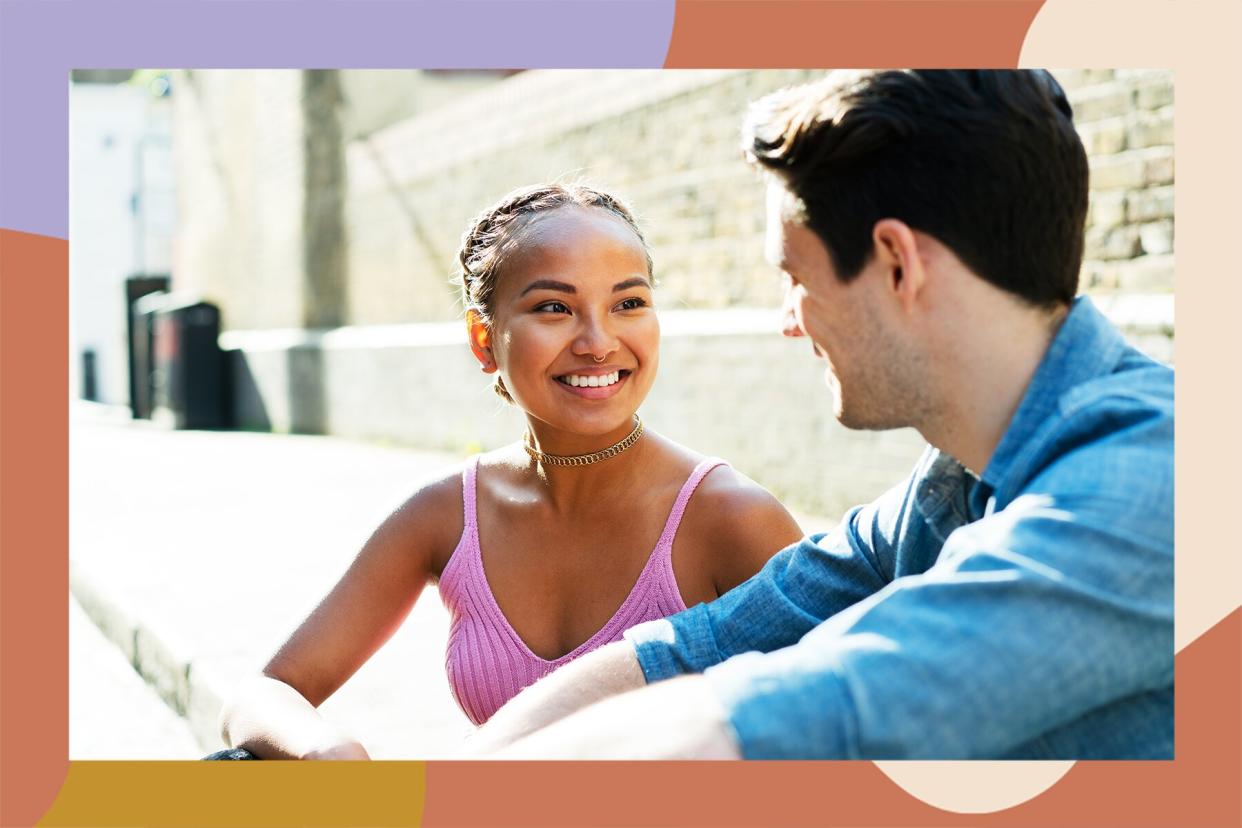Here's Why I'll Always Ask a White Partner If They've Dated Someone of Color Before Me

Getty Images
On our way back from vacation, my then-boyfriend Tyler* and I were stuck at a Beijing airport. Our connecting flight was delayed by two hours and they wouldn't let us off the plane. That's when I heard him frustratedly say, "Man, I'm really not a fan of the Chinese." Whether he meant for me to hear or not doesn't matter—I did hear it and should've said something. But I was too scared to start a fight before a 14-hour flight. Instead, I sat there quietly, pretending not to hear.
As my and Tyler's relationship got more serious, his family would invite me to celebrate religious holidays with them. At a Hanukkah party, a family member of his asked if I could speak a second language? I said that I can't, but I knew how to read and write French. That family member asked in a surprised tone, "Is that even a language known in the Philippines?" It was the first time anyone in his family acknowledged my ethnicity. It was also one of many statements made during our relationship that highlighted the fact that he and some of the people closest to him were not fully prepared to handle me not being white.
In the past, I've never asked someone if they've dated other Asian women before me. I've especially never asked a white partner if they've dated anyone of color before me. (This information would always come way too late when I've already committed.) The naive answer as to why I never brought it up is because I didn't think it mattered. I figured that if they agreed to date me in the first place, it must mean that my tan skin and Filipino background wouldn't be an issue.
But Erica Chito Childs, professor of sociology at Hunter College, explains that asking this question gives you a gauge on what your partner knows about what's going on in the world. "It's about [knowing] if this person is open to understanding that their experience in the world is quite possibly different [than yours] and are they ready for issues that may come up," Chito Childs tells HelloGiggles.
When Tyler met my mom in NYC, a shy, quiet Filipino immigrant, he was clearly very uncomfortable. At one point, I briefly left the two of them alone to go to the bathroom, only to return to find my mom sitting by herself and Tyler standing two feet away from her on his phone. When she returned home to Los Angeles, he made no attempt to keep in touch with her the way I had done with his family. But instead of bringing up how upset I was at this, I ignored those feelings and let it go.
In the U.S., people of color are constantly fighting to be accepted. We tolerate things that are not overtly racist—not to mention endless microaggressions—because all we want is a stamp of approval that we belong here. The burden falls on us to educate others, especially our white friends and partners, about our culture and backgrounds when it really needs to be the opposite.
"In America, there are terms and conditions [people of color are asked to accept] by choosing to live here," life and dating coach, Thomas Edwards, tells HelloGiggles. "But [by asking whether someone has dated other people of color], you're stating the terms and conditions that come with dating you."
Edwards used to, when race-related topics came up, ask women he went out with if they'd ever dated a Black man before him and many of those women have said no. His now-wife, a white woman who has dated men of many different races and ethnicities, was the outlier. It clearly indicated to him that she was open to discussing race.
If they're open to discussing race relations, regardless of their prior experience, it will tell you more about who they are.
When my high school best friend planned a visit to NYC, Tyler naturally wanted to learn more about her. Where in L.A. did she grow up? How close have we stayed in touch since graduating? Is she Asian like me? I said she's Lebanese and he muttered under his breath, "Oh, we don't like them." I was shocked to hear that coming from him. But not wanting to get into Isreal and Lebanon relations and being terrible at confrontation anyway, I pretended not to hear and let it go. (They never ended up meeting during her visit; he said he had gotten "too high" to meet up).
There's a level of intimacy that comes with asking a white partner about their relationship with race and racism. On the surface, my fear is that I'll offend them. I think, Oh my god, I'm making it seem like I think they're racist. But deep down, I'm scared that the person I'm falling for is not as open as they led me to believe.

Getty Images
"If that question asked in a friendly, conversational way elicits a sensitive response, [you are seeing] their coping mechanism to [how they deal with] issues of race and racism," Chito Childs says. "It probably reflects some discomfort [they have] with it. How will they handle that in the relationship?"
So you can imagine how blindsided I was when he abruptly broke up with me with no explanation as to why, how, or when he started feeling that way. Reaching for answers on my own, my mind went into overdrive trying to understand it all. I couldn't help but wonder, "Why did Tyler love me? Did he expect me to be a submissive Asian girl? Did he use me for some Asian Fetish? Did he actually love me?"
You can't ignore race in interracial dating and Asian women dating white men is a complicated dynamic.
The prevalent "Asian fetish" is an extra barrier for us when forming an intimate relationship. I've dated many white men after him that were a lot more respectful towards other races, but questioning motive and desire for Asian women are things I—and other Asian women— are forced to think about when I date someone new.
Dating someone of a different race doesn't automatically make a person not racist or anti-racist, a lesson I learned the hard way. The race conversation is imperative to have if you want the relationship to last. Would things have played out differently had I known his dating experience—or experience with people of color in general—prior to fully committing? Who knows. But I should've asked and it's something I'm trying to learn to do early on with new partners.
Edwards says we can't control how someone is going to react to our questions, but we can control our reaction and how we choose to move forward. If the person you're seeing says you're the first person of color they've dated, you can decide for yourself if you want to stick it out or bail because you don't want the additional burden of acting as their educator. You need to care for yourself first.
*Name has been changed.

